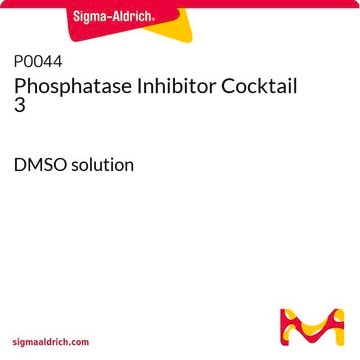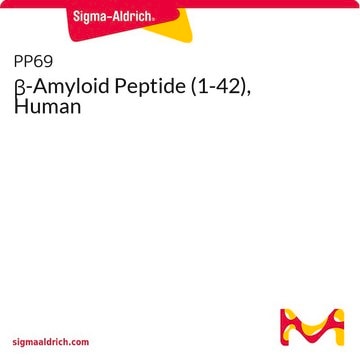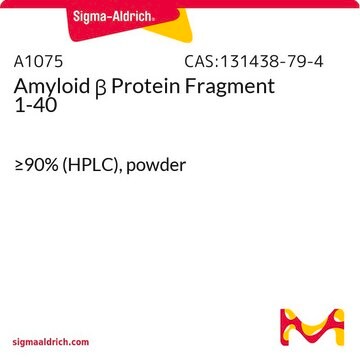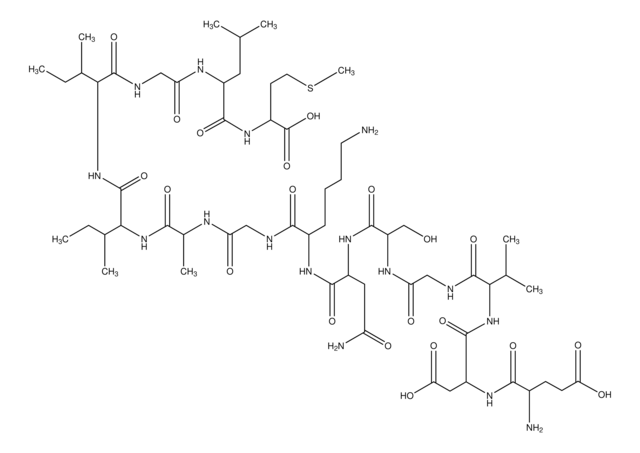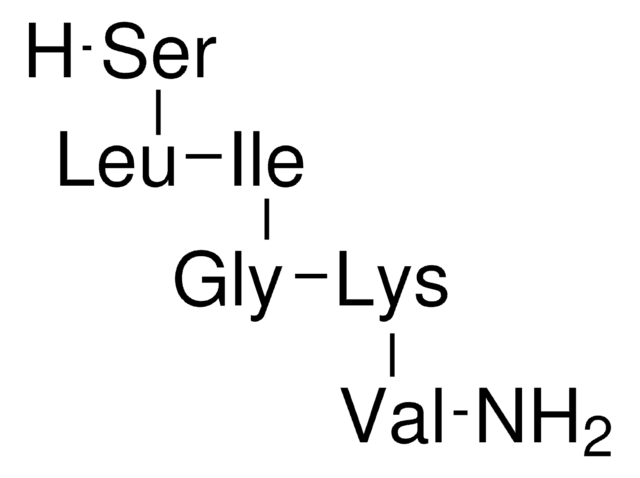About This Item
Wzór empiryczny (zapis Hilla):
C43H78N12O13S1
Masa cząsteczkowa:
1003.22
Kod UNSPSC:
12352200
NACRES:
NA.32
Polecane produkty
Próba
≥95% (HPLC)
Postać
lyophilized
skład
Peptide Content, ≥68%
warunki przechowywania
protect from light
temp. przechowywania
−20°C
Amino Acid Sequence
Ser-Asn-Lys-Gly-Ala-Ile-Ile-Gly-Leu-Met
Zastosowanie
Amyloid β (Aβ) refers to peptides derived from Amyloid precursor protein that vary in length from 36-43 amino acids. Aβ(s) peptides, their peptide fragments and mutated fragments are used to study a wide range of metabolic and regulatory functions including activation of kinases, regulation of cholesterol transport, function as a transcription factor, and regulators of inflammation. Aβ(s) peptides and their peptide fragments are also used to study oxidative stress, metal binding and mechanisms of protein cross-linking in the context of diseases such as Alzheimer′s disease and neurodegeneration.
This page may contain text that has been machine translated.
Kod klasy składowania
11 - Combustible Solids
Klasa zagrożenia wodnego (WGK)
WGK 3
Temperatura zapłonu (°F)
Not applicable
Temperatura zapłonu (°C)
Not applicable
Certyfikaty analizy (CoA)
Poszukaj Certyfikaty analizy (CoA), wpisując numer partii/serii produktów. Numery serii i partii można znaleźć na etykiecie produktu po słowach „seria” lub „partia”.
Masz już ten produkt?
Dokumenty związane z niedawno zakupionymi produktami zostały zamieszczone w Bibliotece dokumentów.
Seung-Pil Yang et al.
Journal of neurochemistry, 93(1), 118-127 (2005-03-19)
beta-amyloid (Abeta) is a major component of senile plaques that is commonly found in the brain of Alzheimer's disease (AD) patient. In the previous report, we showed that an important angiogenic factor, vascular endothelial growth factor (VEGF) interacts with Abeta
Lan Zhang et al.
The journal of physical chemistry. B, 112(30), 8950-8954 (2008-07-03)
Peptide self-assembly on substrates is currently an intensively studied topic that provides a promising strategy for fabrication of soft materials and is also important for revealing the surface chemistry of amyloidogenic proteins that aggregate on cell membranes. We investigated the
Nasz zespół naukowców ma doświadczenie we wszystkich obszarach badań, w tym w naukach przyrodniczych, materiałoznawstwie, syntezie chemicznej, chromatografii, analityce i wielu innych dziedzinach.
Skontaktuj się z zespołem ds. pomocy technicznej